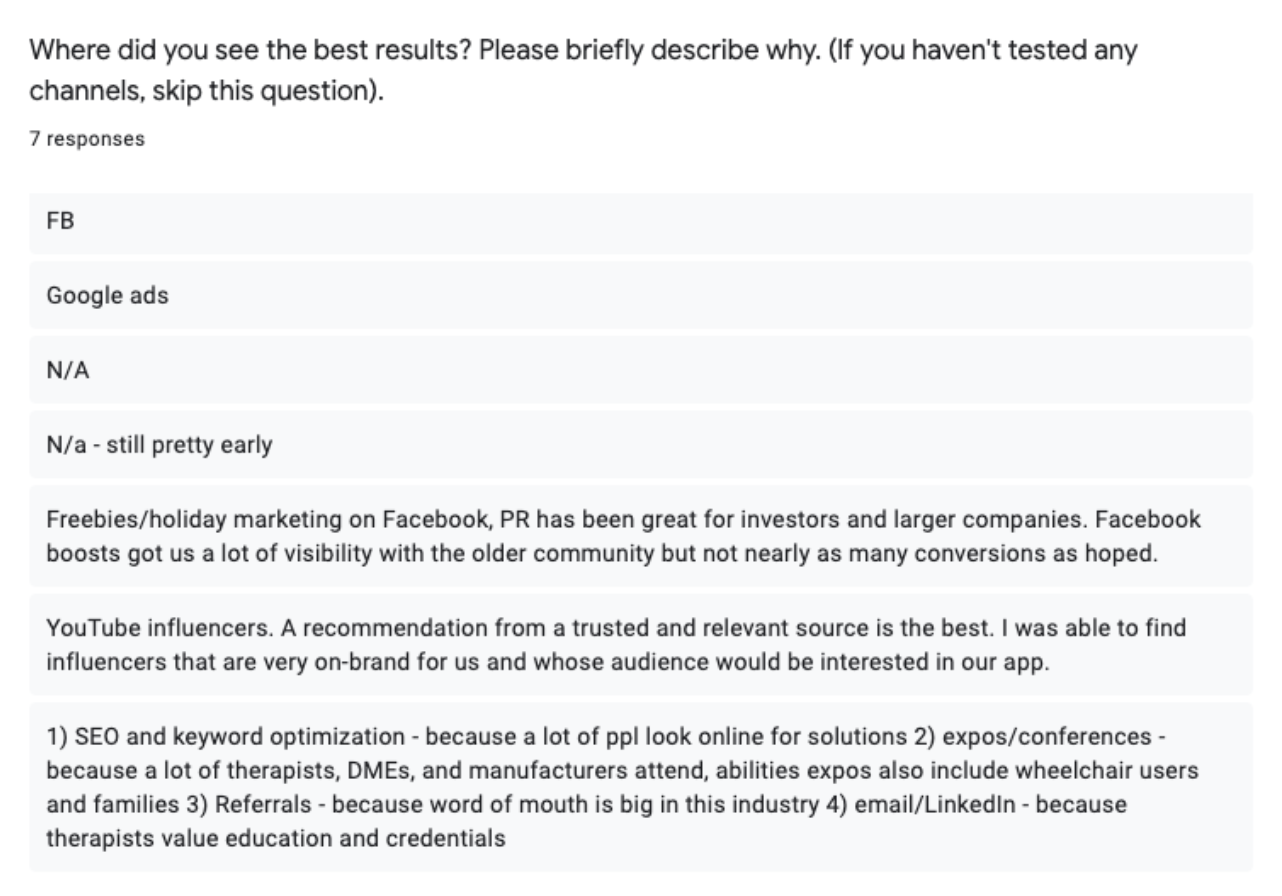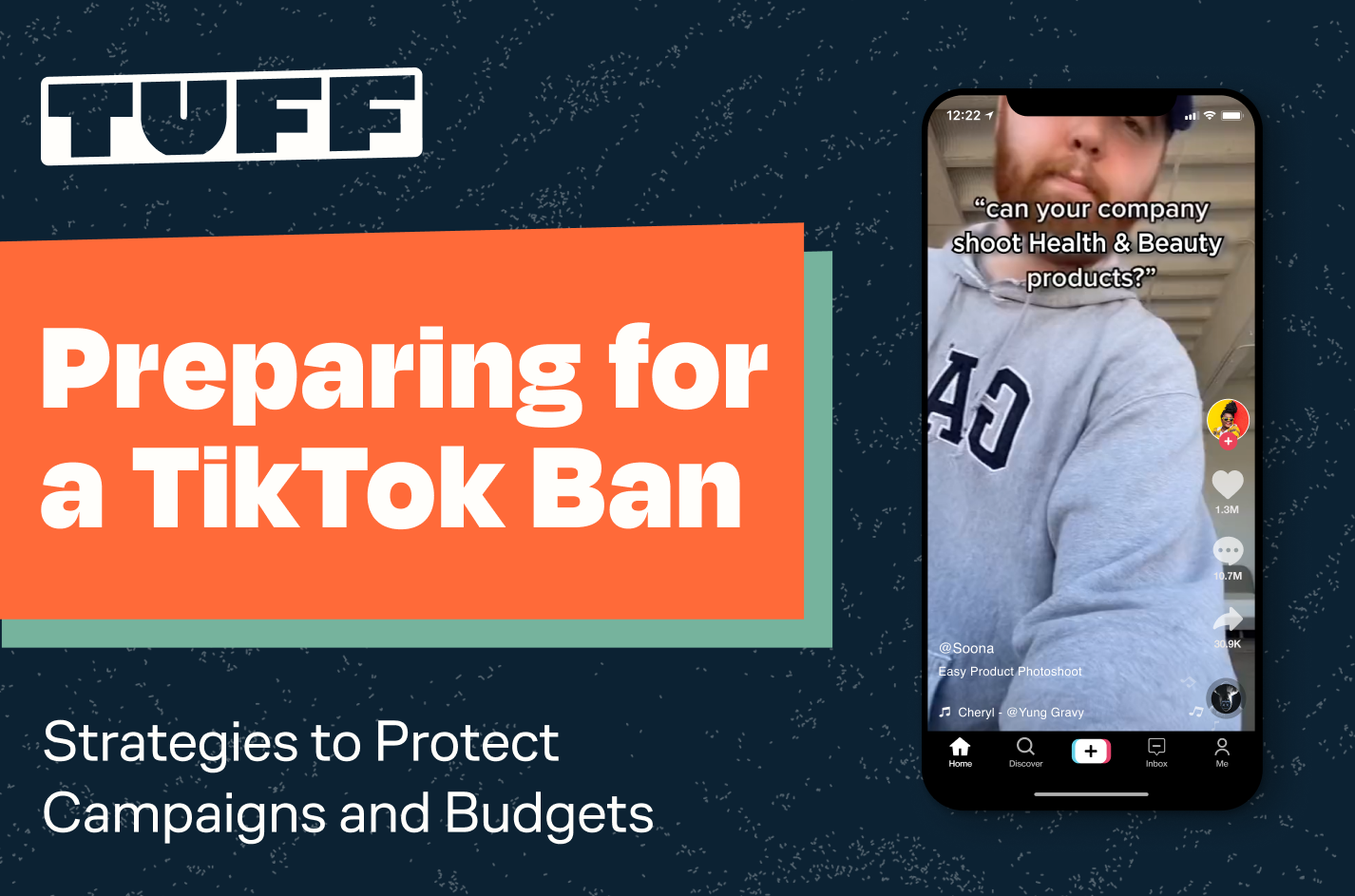5 Common Questions Startup Founders Have About Growth Marketing
This year, Tuff has been fortunate to work with AARP Innovation Labs to connect with startup founders and collaborate on developing growth marketing strategies for their growing businesses. As a startup marketing agency, we’ve partnered with 50+ startups, but the opportunity to work with a dozen startups in a cohort at the same time has been an exciting and informative experience for the Tuff team. Through our AARP partnership, Tuff has provided growth marketing workshops, office hours for one on one discussion with startup founders and problem-solving, and tactical hours for the implementation of strategies for select startups in the cohort.
In our time as a startup marketing agency, we’ve discovered that while no two startups are in exactly the same situation, there’s a LOT of commonality in the questions founders are asking about growth marketing. To get a sense of the questions our founders would ask during our first AARP Innovation Labs cohort, we sent a pre-workshop survey before our 8-week program began. Here’s some of the common questions we noted in the survey, and additionally revealed themselves over the course of the workshop series and office hours.
- What initial marketing channels do founders typically use?
- What initial marketing channels do founders typically see their best results on?
- How are founders supposed to manage their growth marketing efforts?
- How do you prioritize marketing channels?
- My product / service appeals to so many people – why is no one purchasing / signing up?
What initial marketing channels do founders typically use?
In our pre-engagement survey, we asked founders what initial marketing channels they use. We broke it into two types of channels: paid acquisition, and non-paid acquisition. The most common response across both survey questions? Email marketing is being used by 71% of the founders we surveyed.
Email marketing is a common initial channel recommendation by startup marketing agencies, so it’s no surprise that it’s up towards the top. However, we were surprised to see SEO content and PR be the second most common non-paid marketing channel founders said they had used. SEO content can be an effective marketing channel, but one of the common issues startups face is getting quick wins. Since SEO is a longer play, we typically recommend pairing SEO efforts in conjunction with paid acquisition so there is a consistent acquisition source while a startup site begins to rank. For PR,
What initial marketing channels or tactics do founders typically see their best results on?
In our initial survey, founders felt positively about paid acquisition channels for their initial test efforts, in particular, Facebook and Google. However, one of the most common complaints founders had regarding Facebook and Google ads is that they are easy to initially implement, but difficult to master. Some of the common questions we heard in workshops, office hours, and surveys regarding mastering these acquisition channels were….
- “How do I make my Facebook ads more effective with my small budget?”
- “How do I gain the attention of my target audience on Facebook?”
- “How do I use my data to make better decisions on my Google Ads?”
The last one in particular stands out to us, because at the start of our most recent cohort – 67% of our respondents said they are able to use data to make simple decisions, but 33% of them said they are not able to read their data to make any sort of decision. In the early phases of a startup – being able to interpret data is critical for making quick decisions that will impact a startup’s growth trajectory.
How are founders supposed to manage their growth marketing efforts, and how do you prioritize marketing channels?
Our most recent cohort had a 50/50 split on whether or not they had utilized a startup marketing agency or freelancers for their growth marketing efforts. This implies that most founders have a very, very, close relationship with the day-to-day implementation of their growth marketing strategy: either they work closely with an agency, freelancer, team member, or they do it themselves.
Prioritization is the hardest part of being a founder. With no less than 1,000,000 things requiring your attention at all times, marketing can take a back seat. Add limited resources to the equation, and all of a sudden, you have a recipe for unstructured chaos.
In our experience as a startup marketing agency, we create growth marketing strategies based on a few criteria:
- How easy is it to implement this test?
- Has this idea worked before?
- Have I done something similar previously?
- How quickly can I gather learnings from this?
- Will this lead to additional insights for other tests?
This same methodology can be used by founders to manage and prioritize their growth marketing efforts. For example: if I’m a founder, and a long term goal is to have 50% of my leads come in via organic search, I could utilize paid search initially to test a keyword strategy to get quick insights as to how my target audience responds to our product or service. Rather than spending six months writing, publishing, and optimizing content, you can gain insights as to if that keyword is relevant to your business within weeks by running paid search ads.
To get started with mapping our your efforts and priorities as a founder (as it pertains to growth marketing), we recommend starting by putting your ideas on paper. From there, evaluate all the growth tactics you’d like to test based on the above questions. Look for quick wins in low-hanging fruit, low-cost efforts (in time and money) that can provide rapid learning opportunities, and start there.
Last but not least on the subject of prioritization: many founders feel the need to reinvent the wheel when it comes to digital marketing, because their product or service is so innovative. While we applaud and support innovation and testing – it’s always best to start grounded with a fundamental strategy before reaching for the stars.
My product / service appeals to so many people – why is no one purchasing / signing up?
Tuff’s creative strategist, Elle Ossello, loves to use this Kurt Vonnegut quote in relation to product and service marketing.
“Write to please just one person. If you open a window and share your story with the world, your story will get pneumonia.”
When it comes to product and service marketing, having wide potential appeal doesn’t make your product or service a market fit. Very few brands that are successful started off by focusing on appealing to everyone. Instead – when evaluating your target audience, we highly recommend focusing on the people who are most likely to buy your product, or sign up for your service first, rather than trying to reach large audiences of people.
You can figure out who is most likely to buy your product or service by doing qualitative or quantitative research: by checking out your existing customers and asking them questions, by evaluating your demographic behavior in Facebook or Google Analytics, or reading what people have to say about you or your competitors in comment threads online.
By digging deeper into the best potential customer or client fit, you can evaluate their common characteristics, what their buying motivation may be, what they may be purchase objections, and figure out how to communicate directly to their needs. This can help tremendously with refining your messaging, your product or service, and more.
Pro-tip: Once you’ve identified your target audience – evaluate their “life before” your product, and their “life after” your product, and you’re pretty close to having a good grip on your value propositions.
Not all startup marketing agencies are created equal…
A quality startup marketing agency should collaborate with founders on setting them up for long-term success by getting quick wins and lots of learnings. Additionally, they should be flexible – ready to pivot based on testing and the analysis of their results.
And if you’re an early-stage startup, you probably don’t need an agency. When your startup is moving a million miles an hour and any small decision can set off powerful reverberations across your company, stretching a thin budget to hire a full team simply doesn’t add up. If you’re ready for growth marketing help and considering a growth marketing agency, check this out first.

Richard has spent the last five years working at digital agencies, exploring various industries and company lifecycles. I’ve created and implemented growth campaigns on just about every platform for startups, $20,000,000 a year companies, and everything in-between. When not at work, I can be found cheering on the Penguins or Steelers, spending time with my wife and son, playing disc golf, baking, or walking my dogs.









